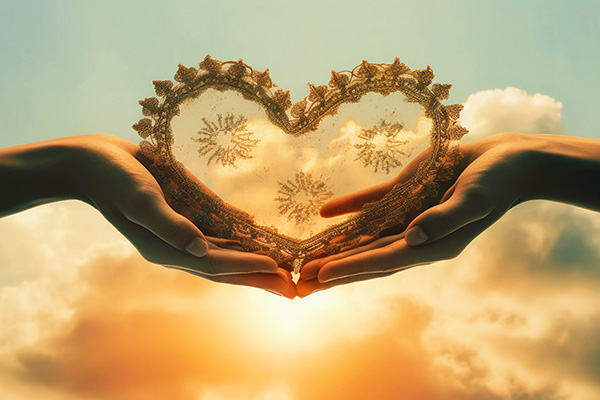soul evolution
Kindness Will Transform Your Life
 Recently, I have noticed that many of my clients are increasingly seeking spiritual guidance for loneliness and feelings of isolation. No matter what their unique circumstances may be, spirit’s response in these matters is always that the solution begins with ourselves.
Recently, I have noticed that many of my clients are increasingly seeking spiritual guidance for loneliness and feelings of isolation. No matter what their unique circumstances may be, spirit’s response in these matters is always that the solution begins with ourselves.
We must be the change we wish to see in our world in order to live a more connected and joyful life. Yes, the world we live in these days can be very stressful and alienating, but that does not prevent us from being more kind and generous to others.
Whether it is a smile, opening a door for a stranger, saying thank you or have a nice day, giving a compliment, or making a small donation to a charity, these small gestures every day have a magical impact on our lives. Spirit says we have chosen to experience this life and it is part of our soul journey to go out and be the difference we wish to see in this sometimes difficult, chaotic world.
Being kind is a powerful daily reminder to ourselves and others of our interconnectedness; that we are all on this journey together. Whether it’s a small gesture of kindness or a grand act of generosity, the ripple effect of compassion creates a chain reaction that inspires others to pay it forward.
Spiritual Growth Without Judgment Or Guilt
 I recently had a nasty fight with my ex-husband that was definitely not in line with the spiritual values and principles I teach my clients. Afterwards, I felt very defeated and disappointed in myself for not practicing what I preach.
I recently had a nasty fight with my ex-husband that was definitely not in line with the spiritual values and principles I teach my clients. Afterwards, I felt very defeated and disappointed in myself for not practicing what I preach.
But then Spirit whispered in my ear.
“It’s okay not to be perfect all the time. Sometimes you need to let the toxic air out of your human ego balloon.”
Upon further reflection, I was reminded that we are all spirit beings in human form, which automatically means we are limited and fallible. No one is perfect in this world.
After all, we have signed up for a very challenging physical adventure in this lifetime, which means we all have problems from time to time and we all make mistakes. That is how we learn and grow. In fact, one of the least spiritual things we can do is pretend we’re perfect.
Sometimes we need to let off steam by releasing pent-up negative energies that tend to build up in our auras as we navigate the ups and downs and many frustrations of our daily human existence. Yes, indeed, there are times when we need to go ahead and just beat the heck out of our ego piñata to get rid of some bad juju! When we release these unwanted energies, we detoxify our energy field to live a more abundant and fulfilling life.
The Exit Points In Our Soul Plan
 I believe that we have access to several ‘exit points’ throughout our lives. These are moments when our spirit or soul can separate from its physical form to return to the non-physical. It is said that we are given a few such exit points in our lifetime.
I believe that we have access to several ‘exit points’ throughout our lives. These are moments when our spirit or soul can separate from its physical form to return to the non-physical. It is said that we are given a few such exit points in our lifetime.
Planet Earth is not our primary home. I like to think of our physical existence in this world as a challenging ‘schoolroom’. This physical life journey can be very difficult at times, and I find that it makes things a little easier if we can look at it from this perspective.
I have yet to meet a person who has had a complete fairytale existence in their life. We have all had some magical moments, but not necessarily as magical as some far-fetched novels or films might portray. Sometimes we feel like we’re banging our heads against the wall just to survive on a daily basis, physically, financially or emotionally, but deep down we all have a built-in survival instinct to stay and complete what we incarnated to do.
Exit points are moments when we have the free will choice to stay in this physical world or return to the non-physical. These moments of choice can be a major health emergency, a near fatal accident, a traumatic event in which we are exposed to extreme danger, and so on. It is usually one of those profound life experiences that make us feel very lucky to still be alive!
A True Soulmate Connection
 As a psychic consultant, I have the unique daily privilege of guiding clients through the complexities of life, including the challenges of romance, dating, and committed relationships. A popular topic in my readings is the question of soulmates.
As a psychic consultant, I have the unique daily privilege of guiding clients through the complexities of life, including the challenges of romance, dating, and committed relationships. A popular topic in my readings is the question of soulmates.
Personally, I have had an interesting journey in this regard that has shaped my understanding of soulmates and the deep connections that can exist between two people beyond the realm of romantic love.
Since the age of 16, I have shared an extraordinary bond with a very special man. Our connection defies conventional labels and goes far beyond the boundaries of a typical friendship or romance.
We’ve always had an uncanny ability to truly understand each other, offer each other unwavering support, and share a safe space for vulnerability and authenticity. We are soulmates in every sense of the word.
People often associate the term ‘soulmate‘ with a special romantic partner, but my journey with this wonderful friend has shown me that soulmates come in many forms. Our relationship is a testament to the fact that soulmates are not limited to romantic entanglements and can play a unique and profound role in our lives.
The Spiritual Symbolism Of The Circle
 The circle has a profound and universal meaning in spirituality across cultures and belief systems. It symbolizes a variety of spiritual concepts and offers insights into the interconnectedness of life, the cyclical nature of existence, and the infinite potential for growth and transformation.
The circle has a profound and universal meaning in spirituality across cultures and belief systems. It symbolizes a variety of spiritual concepts and offers insights into the interconnectedness of life, the cyclical nature of existence, and the infinite potential for growth and transformation.
The circle represents unity and oneness. It is a symbol of completeness because it has neither beginning nor end. This circular continuity reflects the eternal nature of the soul and the interconnectedness of all living beings.
In Native American spirituality, for example, the medicine wheel represents balance and harmony between all aspects of life, including the physical, emotional, mental, and spiritual. Similarly, in Hinduism, the concept of samsara refers to the continuous cycle of birth, death and rebirth, with the circle symbolizing the eternal journey of the soul.
In Christianity the circle represents eternity and sacred union. It is referenced in the Bible as the shape of heaven, and as the beginning and ending of time. For Christian couples, the unending circle of a wedding ring is also the symbolic expression of their sacred, eternal union.
Spiritual Self-Care Or Ego Indulgence?
 Spiritual or metaphysical practice is a pursuit designed to help bring greater meaning and fulfillment to our lives. It is a lifestyle that requires us to be very honest with ourselves and very intentional about the choices we make. But lately I’ve seen a lot of discourse around spirituality that basically encourages you to do pretty much whatever you want in the name of ‘free will’ and ‘self-care.’
Spiritual or metaphysical practice is a pursuit designed to help bring greater meaning and fulfillment to our lives. It is a lifestyle that requires us to be very honest with ourselves and very intentional about the choices we make. But lately I’ve seen a lot of discourse around spirituality that basically encourages you to do pretty much whatever you want in the name of ‘free will’ and ‘self-care.’
Free will is sacred. Yes, it’s true that we are divine, spiritual beings who get to enjoy this incredible adventure of physical life. We get to choose how we move in the world, what we want for ourselves, and how we want to live. But there are two sides to this coin. Yes, we can choose what we want to manifest and how we wish to live our lives, but that does not absolve us of our karmic responsibilities and the consequences of our actions.
I’ve written before about karma and how it’s not meant to be a punishment, but rather a teacher. There are to metaphysical laws that are the basis to our karmic responsibility in this lifetime, namely the universal law of cause and effect and the spiritual law of karma.
The universal law of cause and effect is that for every action there is a reaction. There is a natural order in the universe in which our actions always have consequences, both good and bad.
The spiritual law of karma is a more specific application of the law of cause and effect. According to this law, the totality of our actions in this life, as well as all of our past lives, determine our future. This means that our actions create the conditions for our future experiences, both good and bad.
